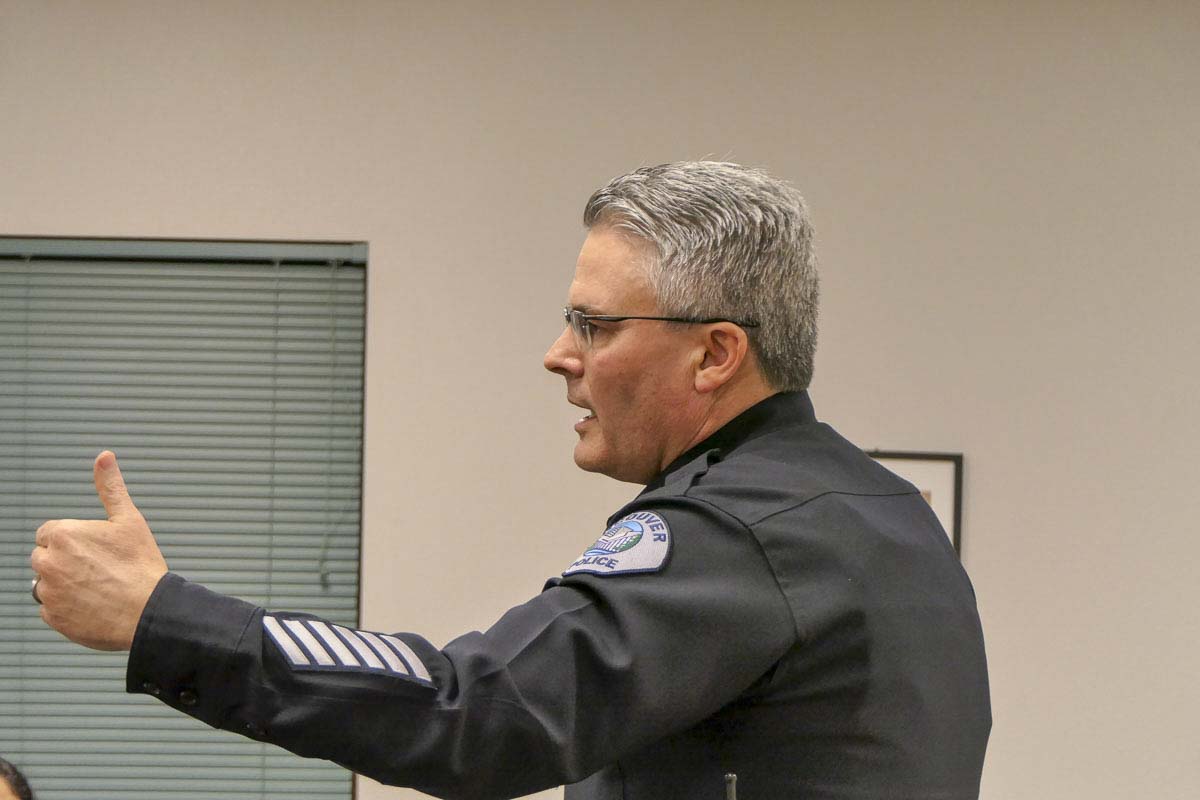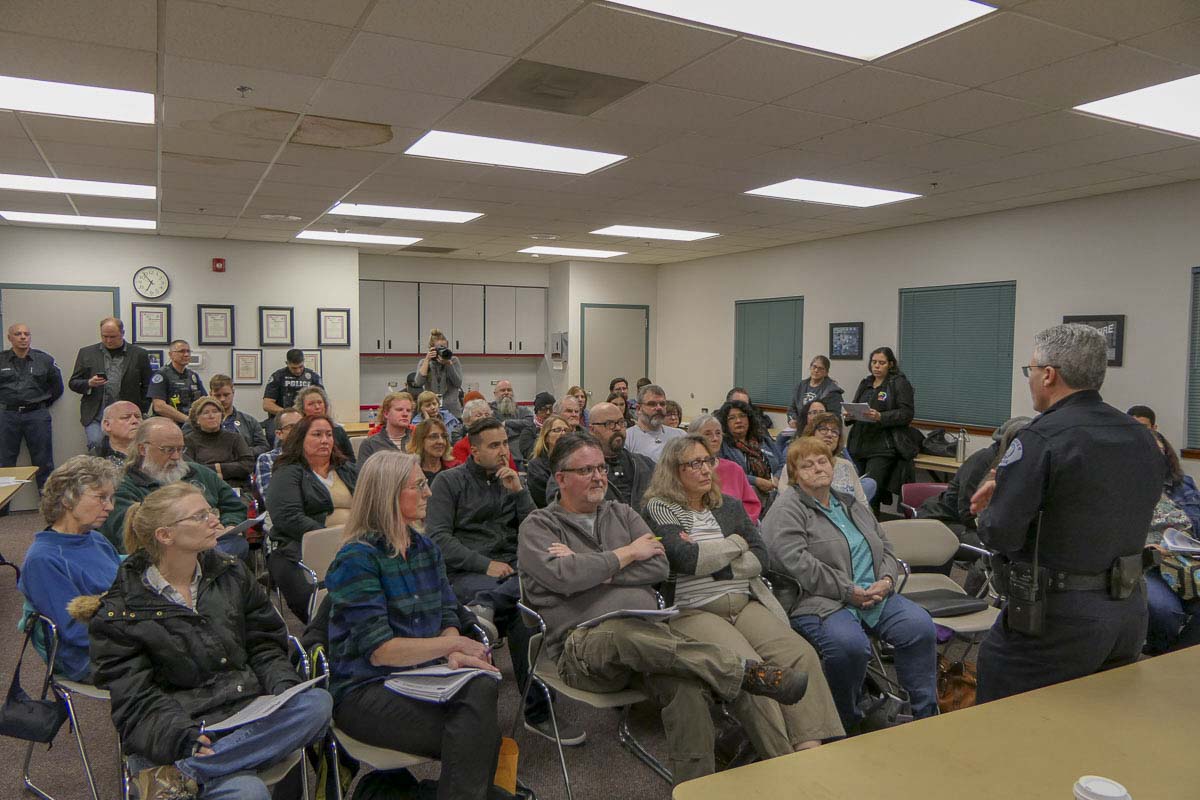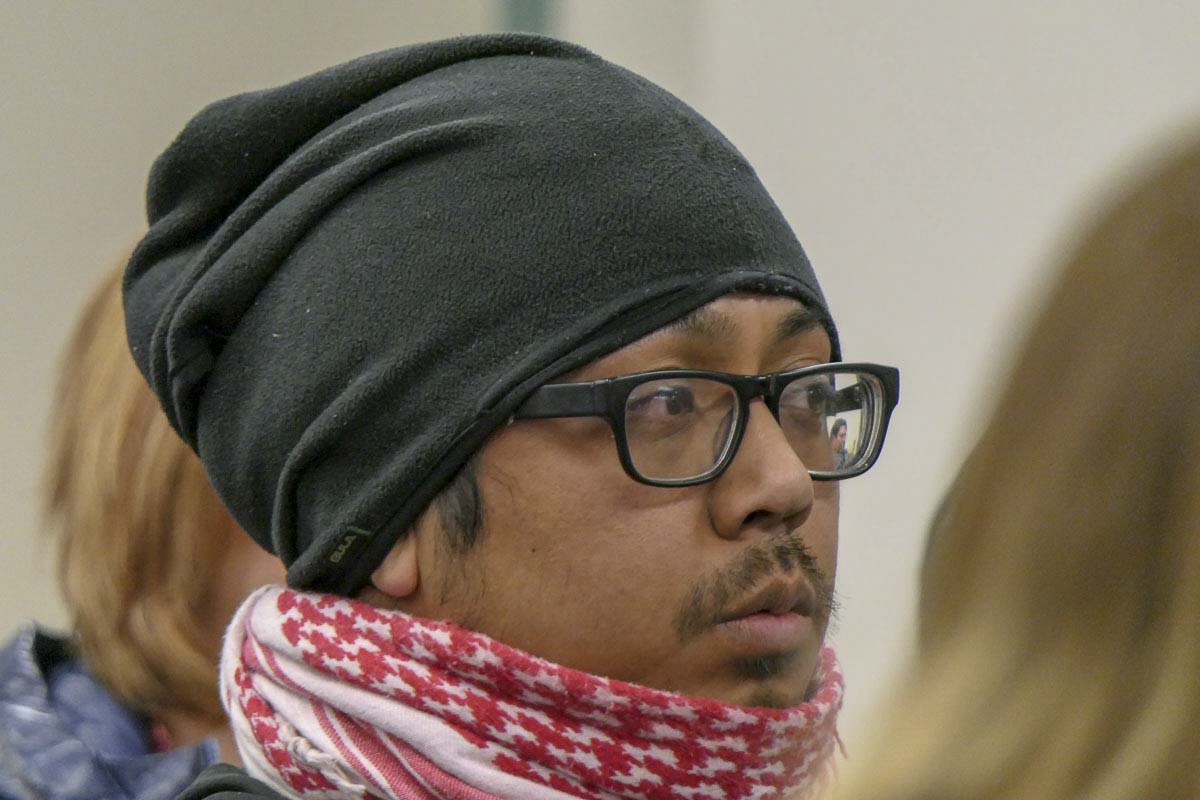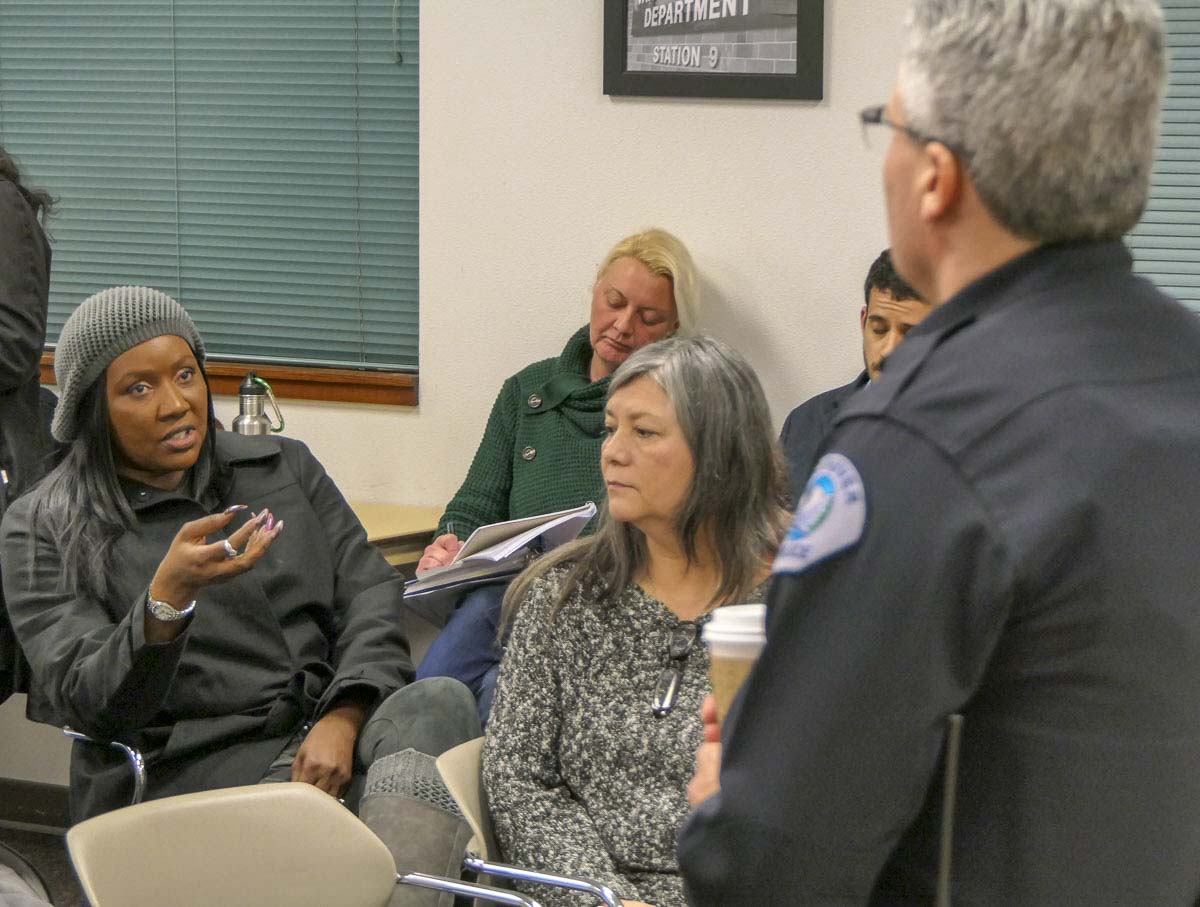Things got a bit testy at times as the community expressed concerns following four officer-involved shootings already this year
VANCOUVER — Vancouver Police Chief James McElvain was scheduled to speak at this month’s meeting of the Vancouver Neighborhood Alliance a long time ago. At that time the plan was to speak about the department’s ongoing efforts to fill a shortage of officers.

At Wednesday’s meeting, McElvain got through an initial statement on staffing, opened it up to questions on that topic, and immediately faced an inquiry into how long an officer is typically on leave after they’re involved in a shooting.
“So I guess we’re going to go in this direction sooner than I thought,” quipped the police chief.
The packed room, and occasional shouting, was evidence that four officer-involved shootings involving Vancouver police since the start of the year has the community’s attention.
“Four incidents in such a short period of time is unusual for a department our size,” acknowledged McElvain, “for Vancouver. It is.”
Much of what the crowd wanted to know is whether the spate of officer-involved shootings was prompting any review of department policy. McElvain said that is part of the investigative process, led by the Regional Major Crimes Team.
“So that we understand, at least from a high level, are we looking at any concerns regarding our policies and procedures,” he said, “or if the prosecuting attorney’s office would have any concerns with the shooting incident.”
One member of the audience pointed out that the fatal shooting of Michael Pierce on Feb. 28 was the third officer-involved shooting for Christopher Douville, a six-year veteran of the Vancouver police force. One of those was in 2011 as a member of Spokane Police, and the other was in Vancouver in 2014. Douville was cleared of any wrongdoing in those earlier cases.
The question, then, was whether there is any further scrutiny of an officer who has been involved in multiple shootings.
“No,” said the chief. “I do appreciate the opportunity to have this conversation because it is a concern. But, that said, you have to take each one of those incidents on their own and ask ‘did we do the right thing for that situation?'”
McElvain, who has a doctorate in sociology, said he did his dissertation on officer-involved shootings, and whether an officer who had opened fire once was likely to do so again.
The answer was “yes,” but McElvain said that doesn’t mean there’s necessarily an issue with the way that officer is doing his job.

“You have to take into consideration what assignment the person is in, what shift they’re working in, what area they’re working in,” he said, noting that there is more of a correlation between citizen behavior and use of force than anything else. For instance, do they have a prior criminal record, are they drunk or on drugs, and are they more likely to disobey an officer’s order during an encounter under those circumstances.
“You can’t make an assumption that just because that officer ends up in another shooting that there’s a problem with that officer.”
Is there enough training for officers
One of the more outspoken voices at the meeting was Ren Autry, director of Outside Inn, a homeless outreach group based in Portland. She wondered if VPD officers were getting sufficient training in recognizing people who are suffering a mental health crisis, versus simply engaging in criminal behavior.
“Sometimes it crosses the line and it’s difficult to know where that gray area is,” said Autry. “And this is where we pay and we ask the training in the field to come back to us in a way that, when we call 9-1-1, we feel like some help is going to come. Not that somebody is doing to die.”
McElvain’s response is that officers undergo frequent training, including peer support, and training on implicit and explicit biases. That test, he pointed out, is available for anyone to take.
“I guarantee everybody that’s breathing in this room is biased. And you’ll get to come face-to-face with what that looks like for yourself,” said McElvain. “So the training that we have is acknowledging that we all do have biases, and then how do we compensate for those, right?”
Beyond that, he said, there is constant work being done to improve how police interact with the community, especially as encounters with people suffering from a mental health crisis continue to rise.
“We spend a lot of time doing research and looking towards best practices, not just in the city of Vancouver, but across our law enforcement to see who’s doing it better than us,” added McElvain, “so that we can improve upon our own tactics and strategies.”
De-escalation versus use of force
McElvain said that, while officers do carry less lethal weapons such as bean bag rounds or tasers, there is no policy that they must use those before potentially lethal force is used.
“If we chose that law enforcement had to do all these other things before they could ever use lethal force, we would have a different conversation that the officer didn’t act quick enough — could’ve stopped this person from doing X,” said McElvain. “It’s almost a no-win situation. I’m not blaming anybody. That’s the role that we have taken on as law enforcement. We understand that we get caught in the middle.”
But the chief also pointed out that VPD officers responded to 100,000 incidents last year, resulting in just two officer-involved shootings. Meanwhile, he added, the department handed out awards to officers on Tuesday night for going above and beyond.
“And I guarantee all the incidents that our people received awards for, you never knew about,” McElvain said. “You never knew about it because our officers go out every day and handle incidents that never rise to this level that we’re talking about right here.”
Racial tensions
The night was punctuated by several outbursts from a man who identified himself only as Anthony and said he was a member of the Democrat-Socialists of America party.

“My people are dying! We’re burying our own! We’re mourning them!” he shouted, as several people asked him to wait his turn to speak.
“Matters like this don’t need decorum,” he responded, accusing the crowd of trying to silence the only black man in the room. “Malcolm X said ‘by any means necessary!’”
Speaking more calmly, but no less forcefully, was Ophelia Noble of The Noble Foundation, who noted that, of the four officer-involved shootings this year, three involved men of color.
“The community of color, right now, is hurting,” said Noble, fighting back tears. “We have not had this experience historically in the 30 years that I have lived in Vancouver. I have never heard — or my mother who has lived here longer than I — of a month with three people of color being wounded by VPD. There is something going on. We want to know what it is and how to interact with a system that is not showing our people the humanity they deserve.”

Noble then got up and left without McElvain directly answering her comments. He did later state that there are conversations going on between VPD and the city of Vancouver about setting up meetings with the local African American community, and other minority groups, to hear more of their concerns.
Body cameras demanded
Following the recent police shootings, a petition demanding that police in Washington state wear body cameras has gained over 1,300 signatures.
“I’ve never said ‘no’ to body-worn cameras,” said McElvain. “I’m saying, eyes wide open community that they’re not free. They’re super expensive. And if you’re saying that that is the priority that we’re going to pay for, then we’ll move in that direction.”
McElvain noted that the actual camera technology is now relatively inexpensive, and has been proven to reduce citizen complaints and often help exonerate officers accused of wrongdoing. But, he added, there is a downside.
“Agencies that jumped into using body-worn cameras have turned them off because they’re crushing their department’s budgets,” he said. “The expense comes in the form of data storage and then our public disclosure laws.”
Vancouver police already responds to approximately 4,000 public disclosure requests each year, says McElvain, primarily for documents and case records.
“Just that is more than a full-time employee’s day, keeping up with that.”
Add in the difficulty of combing through hours and hours of video, making sure domestic abuse or sexual assault victims have their faces blurred out, and dealing with privacy concerns, and McElvain says the cost to implement them is more than they could bear right now.
Told by one member of the group that his explanation was “not acceptable,” McElvain responded, “if you’re strongly wanting us to carry body-worn cameras, by all means, let our governing body know that and I’ll deploy them.”




